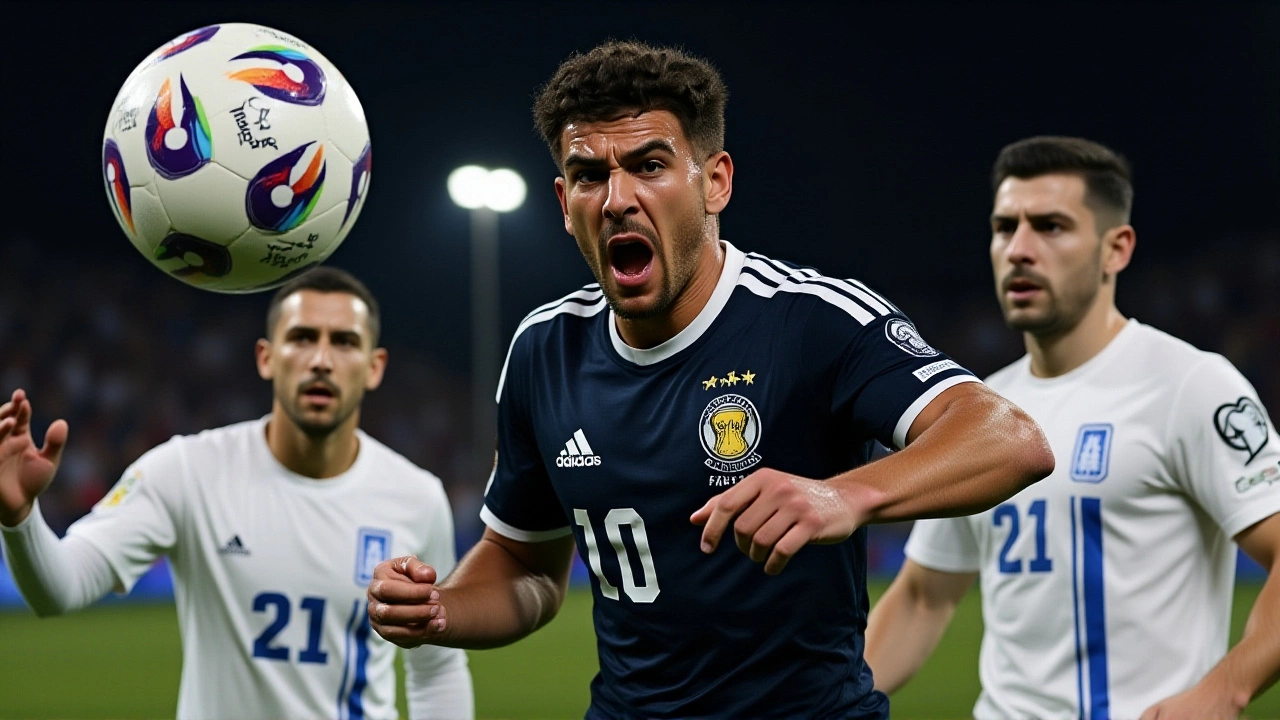Scotland’s 2026 World Cup dreams teetered on the edge after a gut-wrenching 3-2 defeat to Greece in Athens on Saturday, November 15, 2025. Despite a stirring late rally against a 10-man Greek side, the Scotland national team fell short at the Georgios Karaiskakis Stadium, leaving their automatic qualification path hanging by a thread. The result wasn’t just a loss—it was a psychological rollercoaster. Three goals down with 20 minutes left, Scotland looked done. Then came the fight. Two goals in four minutes. A crossbar rattled. A last-gasp header just wide. And still, it wasn’t enough.
From Commanding Lead to Desperate Fightback
Greece came out with a purpose. Anastasios Bakasetas struck in the 7th minute, slotting home after a slick counterattack that exposed Scotland’s high defensive line. By halftime, the Greeks had doubled their lead through a well-worked set piece and added a third just before the break, leaving Scotland stunned. Scott McTominay came agonizingly close in stoppage time, hammering a left-footed effort off the crossbar—a moment that felt like a sign. But it wasn’t. Ché Adams then missed a sitter from six yards, and the scoreboard mocked them: 3-0.The turning point came in the 71st minute. Greece’s Giorgos Masouras was sent off for a second yellow, and everything changed. Scotland poured forward. Lyndon Dykes pulled one back with a powerful header in the 75th minute. Then, in the 81st, John McGinn curled in a stunning free-kick that left the Greek keeper rooted. 3-2. Hampden Park, 1,500 miles away, erupted on live TV. The fans knew what was coming: one more goal, and it could be a miracle.
But the final whistle blew before the equalizer came. Steven Clarke, Scotland’s manager, threw on everything he had—wingers, strikers, even a fullback up front. They had chances. They had momentum. But not enough time. The players collapsed to their knees. The crowd in Athens fell silent. It was cruel, but not unexpected.
The Group C Tug-of-War
Here’s the twist: Scotland didn’t just lose. They lost and still have a lifeline. That’s because Belarus, the group’s minnows, held Norway to a 1-1 draw in Copenhagen on the same night. It meant that despite the defeat, Scotland remained level on points with Denmark—both on 10 points from four games. But Denmark’s +11 goal difference dwarfs Scotland’s +5. That’s the chasm.
"They gave themselves too much to do tonight," said BBC analyst RonnieJ67 after Denmark’s 2-2 draw with Georgia. "But Scotland? They’re still alive. That’s the beauty of this group."
The group standings now read like a thriller: Denmark (10 pts, +11 GD), Scotland (10 pts, +5 GD), Greece (3 pts), Belarus (0 pts). The only way Scotland qualify automatically? Beat Denmark at home. No draws. No losses. Only a win.
The Hampden Decider
On Tuesday, November 18, 2025, Hampden Park in Glasgow will become the most important football ground in Scotland for a generation. The atmosphere will be deafening. The pressure, suffocating. Kasper Hjulmand, Denmark’s manager, will bring a team that’s been dominant but inconsistent—two draws in their last three games, including the 2-2 stalemate with Georgia. They’re not invincible. But they’re dangerous.
Scotland’s squad is battle-tested. McTominay and McGinn are in peak form. The defense, though shaky in Athens, has kept clean sheets in three of their last four qualifiers. The question isn’t whether they can score—it’s whether they can hold firm. Denmark’s Christian Eriksen, still playing at elite level at 33, could be the difference-maker.
"We showed character tonight," Clarke said after the match. "But character doesn’t win qualifiers. Results do. We’ve got three days to fix what went wrong. And then we go to Hampden and fight for everything."

What This Means for the Wider Qualifying Picture
While Scotland’s fate hangs in the balance, the rest of UEFA’s qualifying drama unfolded across Europe. Spain remained perfect with a 4-0 win over Georgia, thanks to two goals from Mikel Oyarzabal. Wales scraped a 1-0 win over Liechtenstein, keeping their hopes alive. Meanwhile, Erling Haaland of Norway, visibly frustrated after the draw with Belarus, told reporters: "We’re building something special. But special isn’t enough yet. We need wins."
Scotland’s path is narrow, but not impossible. This isn’t about talent—it’s about nerve. About belief. About turning heartbreak into fuel.
Frequently Asked Questions
Can Scotland still qualify automatically for the 2026 World Cup?
Yes—if Scotland beats Denmark at Hampden Park on November 18, 2025, they top Group C and qualify automatically. A draw or loss sends them to the playoffs. Their +5 goal difference is a major disadvantage against Denmark’s +11, so they must win outright. No other result will suffice.
Why did Greece perform so well despite being bottom of the group?
Greece, long considered underdogs, have shown grit in tight games. Their win over Scotland was their first in four qualifiers, but they’ve been defensively organized and capitalized on Scotland’s early mistakes. Their coach, John van den Brom, has instilled discipline, and home advantage in Athens played a role. This result could be a turning point for their campaign.
What’s the significance of Belarus holding Norway to a draw?
It kept Scotland’s automatic qualification hopes alive. Without that result, Scotland’s loss would have dropped them to third place, likely ending their direct path. Belarus’s point in Copenhagen meant Denmark and Scotland remained tied on points, making the final match a winner-takes-all clash. It’s a classic example of how lower-ranked teams can shape qualification outcomes.
How does goal difference affect Scotland’s chances?
Goal difference is Scotland’s Achilles’ heel. Denmark leads by six goals (+11 to +5), meaning Scotland must win by at least two goals to overtake them on goal difference if they finish level on points. But since only a win qualifies them automatically, the margin doesn’t matter—just the result. Still, if they draw and end level on points, Denmark wins the group on goal difference.
Has Scotland ever qualified for a World Cup after losing their penultimate qualifier?
Yes—in 2007, Scotland lost 2-1 to Ukraine in their penultimate qualifier but still topped their group after beating Ukraine 1-0 in the final match. They then beat Ukraine again in a playoff to reach the 2006 World Cup. History shows it’s possible, but it requires both belief and brilliance. This Scotland squad has the heart—but can they deliver the performance?
What happens if Scotland loses to Denmark?
They’ll drop to second place and enter the UEFA playoffs, likely facing a team like Turkey, Sweden, or the Netherlands. While still possible to reach the World Cup, the playoff path is unpredictable and dangerous. Scotland’s last playoff win was in 2010; they’ve lost three since. A loss in Glasgow could mean another decade of near-misses.
